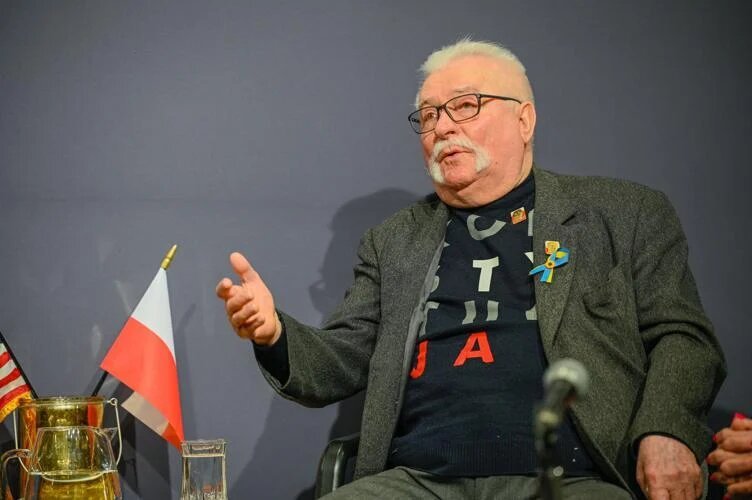By Robert Wuerdeman, Catherine Hinse, Sarah Barnwell, Allyson Hocter, Paul Lambert
Granite State News Collaborative
Franklin Pierce University President Kim Mooney (left) awards former president of Poland Lech Walesa with the Fitzwater Visiting Scholar Medallion on Monday morning. Throughout the 1970s and 80s, Walesa spoke out against the communist regime in Poland and organized labor strikes. He later went on to become the first president in Poland to win in a popular vote.
Luke Newman / Franklin Pierce University
Former Polish President Lech Walesa entered the television studio at the Marlin Fitzwater Center for Communication at Franklin Pierce University in a gray suit coat with a black T-shirt on underneath.
In large red and white letters, “Konstytucja” or Constitution, was emblazoned on the shirt.
He noted that the audience was dressed formally, in shirts and ties, but he was using his shirt to express his support for the Polish constitution and his freedom of speech.
“I keep sending the message, every second of my present life: disagree with every possible violation of the constitution,” he said.
Lech Walesa, who was president of Poland from 1990 to 1995, spoke Monday morning to students at Franklin Pierce University in Rindge about the importance of a free press in a democracy.
Luke Newman / Franklin Pierce University
The shirt and Walesa set the tone for his appearance at the Rindge university as a visiting scholar. Dozens of students and faculty from the school, as well as high school students from around New Hampshire, came out to hear him speak about freedom of the press, democracy, and the role of the United States as a world leader.
During the interview with a student moderator, Poland’s first democratically elected president since 1926 said that the world was in the midst of a transitional period. He implored the audience to use send their own messages about freedom in what he called “the era of the word.”
“Russia wants to solve issues as they did in the old era, with force,” he said, referring to a time before the Soviet Union fell. “That is why we cannot harmonize.”
Freedom of the press in the former Soviet Union and in Russia would have prevented the rise of leaders like Stalin, Brezhnev, and Putin, he said.
Franklin Pierce University senior Kaitlyn Acciardo asks Lech Walesa questions about the value of free press in a democracy during an event on the Rindge campus Monday morning. Walesa was the president of Poland from 1990 to 1995 and oversaw the country’s transition from communism to a free-market democracy.
Luke Newman / Franklin Pierce University
Walesa so reveres freedom of speech that he took an absolutist position on state censorship. He said under no circumstances, not even national security and safety, should the media be silenced. A free press can serve as a check on governmental power, he noted.
“Once we overcome censorship, and do not allow it, we can achieve our goals,” the former president said.
Walesa also pointed to the importance of free and fair elections, advocated for strict term limits, and praised separation of powers as “the best system.”
The Nobel Laureate said the Polish underestimation of the importance of elections and political participation led to the country’s current constitutional crises and overextension of government power.
Lech Walesa (second from right), who was president of Poland from 1990 to 1995, spoke Monday morning to students at Franklin Pierce University in Rindge about the importance of a free press in a democracy.
Luke Newman / Franklin Pierce University
Walesa then warned the audience of allowing this to occur in their own communities.
The visiting scholar said that the United States has a responsibility as a world power to serve as a beacon for freedom and democracy. He talked about the war between Russia and Ukraine, noting that even if Ukraine wins, the dangers that Putin represents in Russia will not go away without a fundamental move toward democracy and a free press in that country.
“We must not have a solution in which one mad man controls the world,” he said.
These articles are being shared by partners in The Granite State News Collaborative. For more information visit collaborativenh.org.




